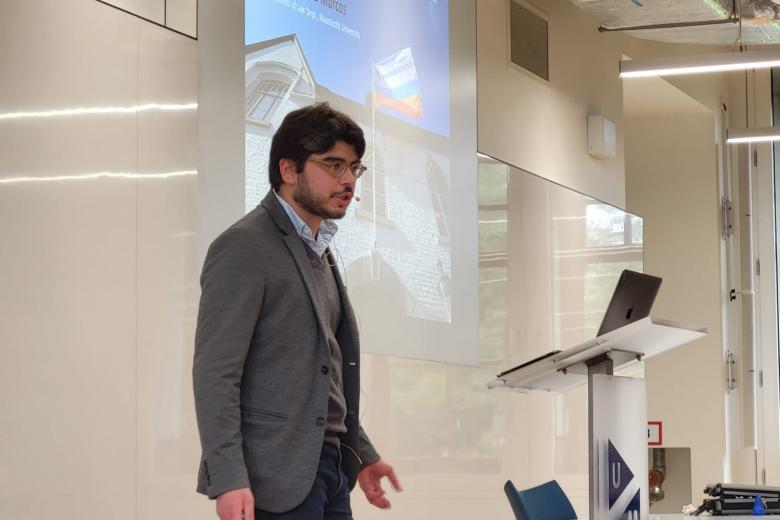Exploring Artificial Intelligence and Regulatory Challenges in Marine Environmental Policy
As part of the ‘AI & Marine Environmental Policy: What Role for Automated Systems?’ research project, a sensemaking workshop took place at Maastricht University’s Faculty of Law on March 28, 2025.
Funding
The research project is funded by an early career grant from the Empirical Legal Studies (ELS) Academy and the Science Committee of Maastricht University’s Faculty of Law, received by Henrique Marcos and Rohan Nanda.
The Workshop
In this sensemaking workshop, ‘Marine Environmental Policy and Compliance, Regulatory Challenges and Potential Role of AI-Driven Solutions’, professionals from diverse fields—including climate science, marine policy, EU law, international law and Artificial Intelligence (AI) —convened to discuss regulatory challenges in marine environmental policy and the potential of AI-powered solutions. Discussions centred on key issues such as the fragmented nature of international marine governance frameworks, the implementation gaps in legal norms, and the complexities of enforcing environmental regulations at both global and national levels.
Challenges and Opportunities
Matthias Vanhullebusch (Hasselt University) spoke about the importance of trust and relational normativity as foundational elements of the effectiveness of international environmental treaties. Suvi-Tuuli Puharinen (Maastricht University) complemented this viewpoint by highlighting the practical challenges of translating international and regional marine obligations into enforceable national policies, citing examples such as agricultural pollution and overfishing.
Seline Trevisanut (Utrecht University) discussed the complexity of ‘ocean governance,’ highlighting how issues as diverse as seabed mining and maritime labour regulation fall under this umbrella term. Wagner Menezes (University of São Paulo) introduced the “Blue Amazon Doctrine” to demonstrate how national experiences could enrich global governance discourses.
Parveen Kumar (Wageningen University & Research) highlighted urgent marine climate threats with data-driven tools, such as the European Marine Climate Change Index, emphasising the importance of evidence-based policymaking. Julia Schutz Veiga (Nova Law School / Ocean Voices, Edinburgh University) and Pedro Vasques (Unicamp) discussed socioeconomic disparities in marine resource governance, particularly negotiations over biodiversity beyond national jurisdictions and community-level environmental conflicts in developing countries.
Hannes Westermann and Rohan Nanda, members of Maastricht University's Law and Tech Lab, presented AI-driven solutions capable of improving access to legal compliance information and navigating complex regulatory frameworks.
Conclusions
The workshop emphasised the importance of integrated, coherent regulatory strategies supported by data-driven approaches. It also made it clear what areas need more research, like increasing trust in international agreements, making governance framework definitions clearer, and distributing marine technology fairly to fix differences in compliance. Overall, the event encouraged people from different fields to talk to each other, which not only shed light on current problems but also showed ways that policies could be improved and technology could be used in marine environmental governance.
H. Jerônimo Bezerra Marcos
Dr Henrique Jerônimo Bezerra Marcos (He/Him/His) is a legal scholar specialising in international law, legal reasoning, and the philosophy of law. His research focuses on how law and technology shape the governance of environmental futures, particularly in the context of the climate crisis and ocean governance.

R. Nanda
Please see my personal webpage for the latest information about my research, teaching, and other activities.

-
Overriding Mandatory Rules in International Arbitration: Balancing Business Freedom and State Interests
Imagine two companies from different countries enter a business deal. They pick a neutral country’s law to govern their contract and agree to arbitrate any disputes, thinking they can sidestep each other’s national courts. But what if one country’s law absolutely prohibits something in the deal –...

-
What is coercion?
According to classic economic thinking—and to common sense—if two parties agree to a deal, both are made better off, otherwise they would not have agreed. This idea is also reflected in contract law, at least in its basic form, treats consent as the cornerstone of a valid contract. If both sides say...

-
Should Employees Participate in Corporations? A Law and Economics Perspective.
When we speak of corporations, we usually think of shareholders and managers: the former provide capital, the latter make decisions. Yet, without the contributions of its employees, no corporation can survive, let alone thrive. In my PhD thesis, I answered the question of how employee participation...
